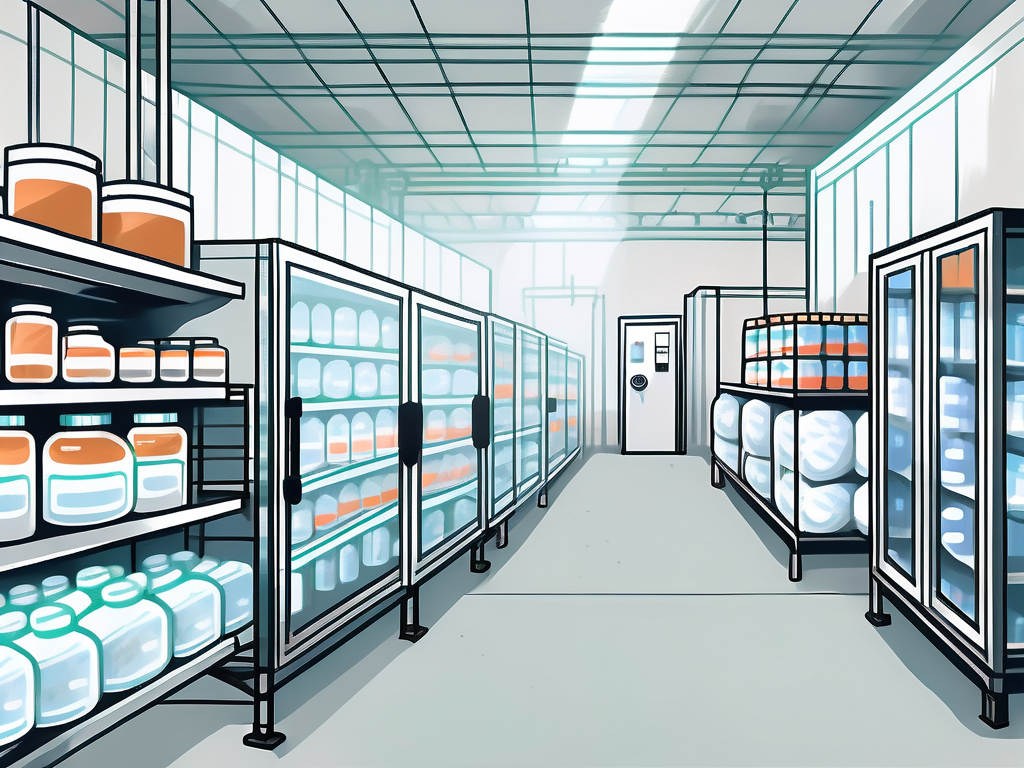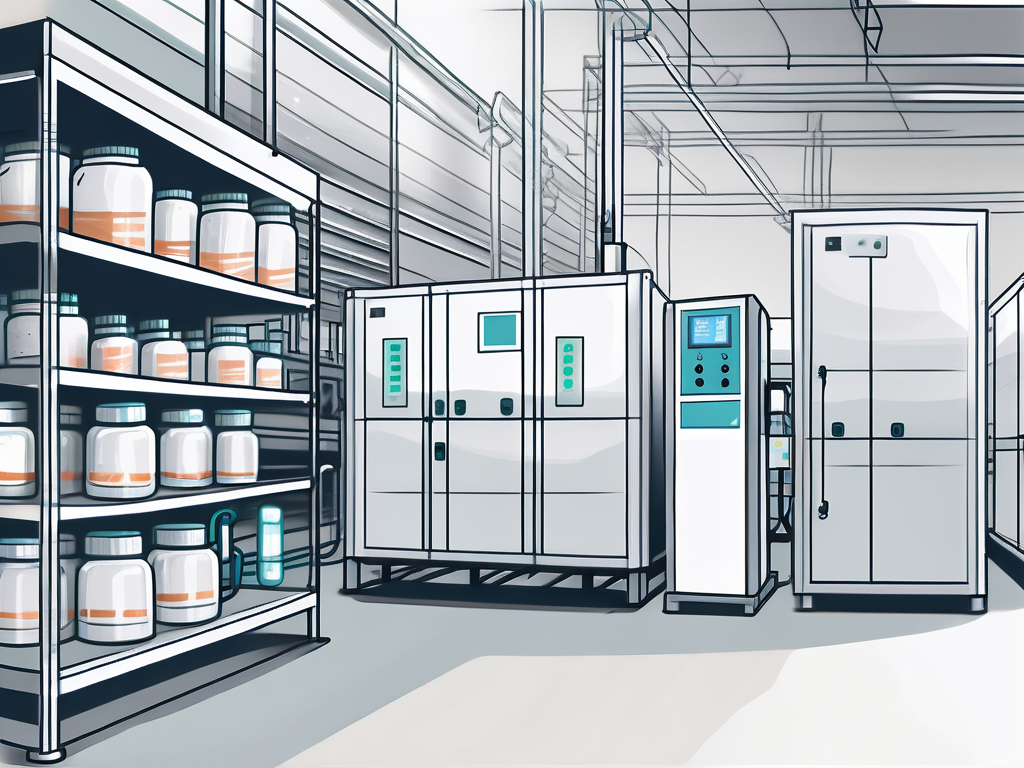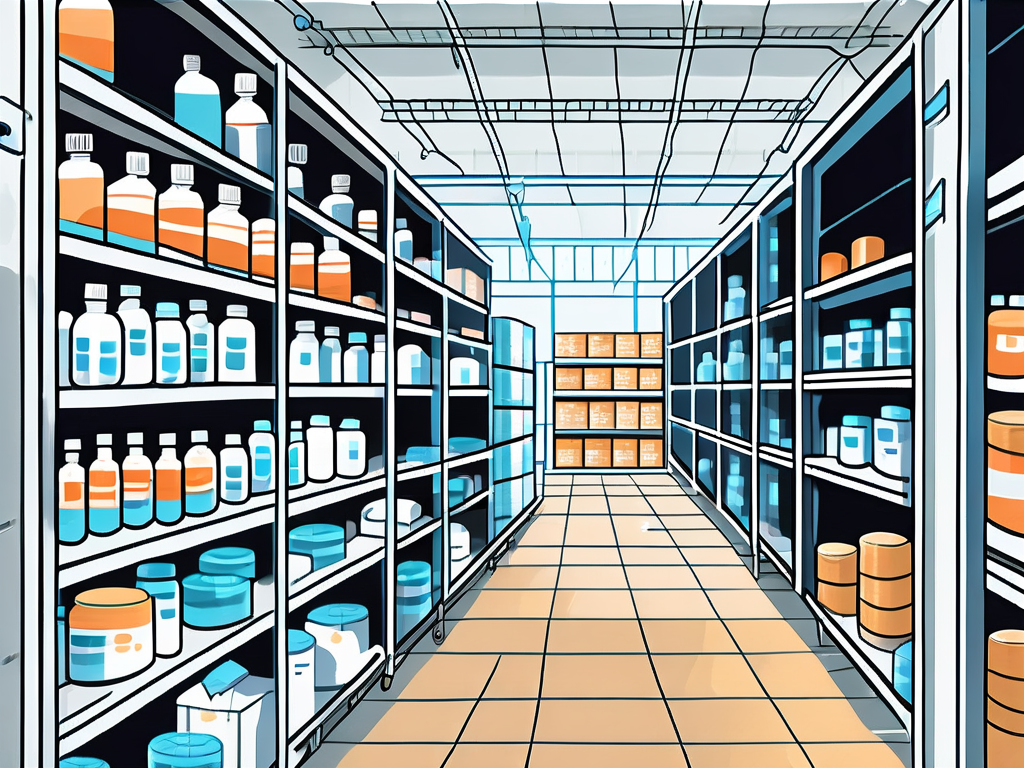In the pharmaceutical industry, adherence to quality and safety standards is of utmost importance. One crucial aspect of maintaining high standards is the implementation of Good Manufacturing Practices (GMP) in pharmaceutical warehouses. GMP regulations are designed to ensure that pharmaceutical products are consistently produced and controlled to meet quality standards. In this article, we will delve into the importance of GMP in pharmaceutical warehouses, the key regulations to follow, the challenges in implementing GMP standards, and the consequences of non-compliance.
Understanding the Importance of GMP in Pharmaceutical Warehouses
Defining Good Manufacturing Practices (GMP)
Good Manufacturing Practices, commonly known as GMP, are a set of regulations and guidelines that outline the minimum requirements for the facilities, equipment, personnel, and processes involved in the production, storage, and distribution of pharmaceutical products. GMP standards are established to ensure that medicinal products are consistently produced and controlled according to quality standards. These standards are applicable to various aspects of pharmaceutical manufacturing, including warehouses.
Pharmaceutical warehouses play a critical role in the storage and distribution of medical products, making adherence to GMP crucial in these facilities. GMP regulations cover a wide range of requirements, including proper storage conditions, accurate inventory management, and stringent quality control measures. By following GMP guidelines in warehouses, pharmaceutical companies can maintain the integrity of their products throughout the supply chain.
The Role of GMP in Ensuring Quality and Safety
GMP regulations aim to ensure that pharmaceutical products maintain their identity, strength, quality, and purity. By implementing GMP standards in warehouses, pharmaceutical companies can minimize the risk of contamination, mix-ups, and errors that could compromise the quality and safety of the products. GMP also plays a crucial role in maintaining product consistency and reducing the likelihood of batch failures or recalls.
Furthermore, adherence to GMP in pharmaceutical warehouses helps companies meet regulatory requirements set by authorities such as the Food and Drug Administration (FDA) and the European Medicines Agency (EMA). Non-compliance with GMP guidelines can result in regulatory sanctions, product recalls, and damage to the reputation of the company. Therefore, maintaining GMP standards in warehouses is not only essential for product quality and safety but also for regulatory compliance and business sustainability.
Key GMP Regulations for Pharmaceutical Warehouses
Storage and Distribution Regulations
Proper storage and distribution practices are essential for maintaining the quality and integrity of pharmaceutical products. GMP regulations specify requirements for the storage conditions, temperature control, segregation, and documentation of stored products. Warehouses must adhere to these regulations to prevent deterioration, cross-contamination, and unauthorized access to pharmaceutical products.
Ensuring proper storage conditions involves factors such as humidity levels, exposure to light, and ventilation within the warehouse. Temperature control is crucial for certain medications that are sensitive to heat or cold. Segregation of products is necessary to prevent mix-ups and ensure accurate tracking of inventory. Documentation of stored products should include details such as batch numbers, expiry dates, and storage locations to facilitate efficient stock management.
Documentation and Record Keeping Regulations
GMP regulations emphasize the importance of accurate documentation and record keeping in pharmaceutical warehouses. It is essential to maintain comprehensive records of incoming and outgoing products, stock movements, temperature logs, and any deviations or incidents that occur. These records serve as evidence of compliance and can be valuable in identifying and rectifying any issues that arise.
Record keeping also extends to maintaining records of cleaning schedules, pest control measures, and equipment calibration logs. These records help demonstrate that the warehouse environment is maintained in a hygienic and controlled manner, reducing the risk of contamination or product mix-ups. Regular audits of documentation ensure that all processes are being followed according to GMP guidelines.
Personnel Hygiene and Training Regulations
Proper personnel hygiene and training are critical to maintaining GMP standards in pharmaceutical warehouses. Employees must follow strict hygiene practices, including proper handwashing, wearing appropriate protective clothing, and refraining from smoking or eating in designated areas. Training programs should be implemented to ensure that staff members are knowledgeable about GMP requirements and can effectively carry out their responsibilities.
Regular training sessions should cover topics such as contamination control, proper handling of pharmaceutical products, and emergency response procedures. Ongoing education and assessment of personnel ensure that employees remain up-to-date on the latest regulations and best practices in pharmaceutical warehousing. By investing in the training and development of warehouse staff, companies can uphold GMP standards and safeguard the quality of pharmaceutical products throughout the storage and distribution process.
Implementing GMP Standards in Pharmaceutical Warehouses
Ensuring the implementation of Good Manufacturing Practice (GMP) standards in pharmaceutical warehouses is essential to maintain the quality and safety of medical products. It involves a meticulous and systematic approach that companies must adhere to strictly. By following GMP guidelines, pharmaceutical warehouses can guarantee that their operations meet the necessary regulatory requirements.
Steps to GMP Compliance
Implementing GMP standards in pharmaceutical warehouses requires a systematic approach. Companies must start by conducting a comprehensive assessment of their existing practices and identifying any gaps or areas for improvement. This assessment may include evaluating the warehouse layout, storage conditions, personnel training procedures, and documentation systems. Based on the findings, an action plan should be developed to address the identified gaps and ensure compliance with GMP regulations.
Moreover, companies need to establish robust quality control measures to monitor and verify that GMP standards are being followed consistently. This includes regular inspections, audits, and quality assurance checks to uphold the integrity of the pharmaceutical warehouse operations. By implementing a proactive quality control system, companies can detect and rectify any deviations from GMP standards promptly.
Challenges in GMP Implementation
Implementing GMP standards in pharmaceutical warehouses can pose various challenges. Some common obstacles include cost constraints, resistance to change, and the complexity of updating existing infrastructure. Additionally, ensuring consistency and compliance across all warehouse operations and personnel can be a daunting task. To overcome these challenges, proper planning, training, and ongoing monitoring are crucial.
Furthermore, companies must stay updated on the latest developments in GMP regulations and industry best practices to ensure continuous compliance. This involves investing in staff training programs and fostering a culture of quality and compliance within the organization. By staying proactive and adaptable, pharmaceutical warehouses can navigate the challenges of GMP implementation effectively and uphold the highest standards of quality in their operations.
Monitoring and Maintaining GMP Compliance
Regular Audits and Inspections
To ensure ongoing adherence to GMP regulations, regular audits and inspections should be conducted in pharmaceutical warehouses. Internal and external auditors can assess the warehouse’s compliance with GMP standards, identify any non-compliance issues, and recommend corrective actions. These audits serve as an opportunity to continuously improve processes, address deficiencies, and maintain the highest quality standards.
During audits, auditors may review documentation, observe operations, and interview staff to ensure that GMP practices are being followed consistently. They may also inspect storage conditions, cleanliness, and equipment maintenance to verify compliance with regulatory requirements. By conducting thorough audits, pharmaceutical warehouses can demonstrate their commitment to quality and regulatory compliance.
Continuous Improvement in GMP Practices
GMP practices in pharmaceutical warehouses should continuously evolve to keep up with changing regulations and industry best practices. Regular training programs and educational initiatives can help employees stay updated with the latest requirements and cultivate a culture of continuous improvement. By encouraging feedback, implementing suggestions, and conducting regular reviews, warehouses can drive progress and ensure the highest level of GMP compliance.
Continuous improvement efforts may involve updating standard operating procedures, investing in new technologies to enhance efficiency and quality control, and fostering a proactive approach to risk management. By embracing a mindset of continuous learning and adaptation, pharmaceutical warehouses can not only meet GMP standards but also exceed them, setting a benchmark for excellence in the industry.
The Impact of Non-Compliance with GMP Regulations
Potential Risks and Consequences
Non-compliance with Good Manufacturing Practice (GMP) regulations can have severe consequences for both pharmaceutical companies and consumers. It goes beyond just a matter of legality; it directly affects the safety and quality of pharmaceutical products. When GMP standards are not followed, it can lead to compromised product quality, safety issues, and an increased risk of adverse events.
Imagine a scenario where a pharmaceutical warehouse fails to adhere to GMP regulations. As a result, a batch of medication is contaminated with impurities that could potentially harm patients. This can have devastating consequences, not only for the individuals who consume the compromised product but also for the reputation of the pharmaceutical company responsible.
Furthermore, non-compliance can result in costly recalls, legal action, damaged reputation, and regulatory sanctions. The financial burden of a recall alone can be significant, not to mention the potential lawsuits that may follow. Pharmaceutical companies may find themselves facing multiple legal battles, from patients seeking compensation for injuries caused by non-compliant products to regulatory authorities taking legal action against the company.
Legal Implications of Non-Compliance
Pharmaceutical companies that fail to comply with GMP regulations may face a range of legal consequences. Regulatory authorities have the power to issue warnings, fines, and even suspend or revoke manufacturing licenses. These penalties can have a profound impact on the operations and profitability of a pharmaceutical company.
In some cases, non-compliance with GMP standards can even lead to criminal charges. This is especially true when intentional misconduct or negligence is involved, resulting in harm to patients. The legal implications can extend beyond fines and warnings, potentially leading to criminal investigations and prosecutions.
It is crucial for pharmaceutical warehouses to prioritize GMP compliance and take proactive measures to mitigate the risk of non-compliance. This includes implementing robust quality control systems, conducting regular audits, and providing ongoing training to employees. By investing in GMP compliance, pharmaceutical companies can protect not only their bottom line but also the well-being of patients who rely on their products.
As we can see, GMP rules and regulations play a vital role in ensuring the safety, quality, and efficacy of pharmaceutical products stored in warehouses. Adhering to GMP standards requires careful planning, ongoing training, and regular audits to maintain compliance. Companies that successfully implement and maintain GMP practices benefit from enhanced product quality and safety, while also mitigating legal and reputational risks.
By prioritizing GMP compliance, pharmaceutical warehouses contribute to the overall integrity of the pharmaceutical industry and the well-being of patients worldwide. It is a responsibility that should not be taken lightly, as the consequences of non-compliance can be far-reaching and devastating.







